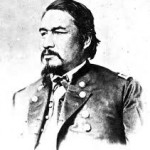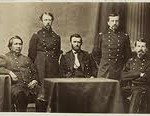 Ely S. Parker, Civil War Patriot and Seneca Chief, was born on the reservation near Indian Falls, New York in 1828. Prior to the war, he studied Law and Engineering. Parker was a brilliant student who excelled at debate, but was thoroughly disappointed when Harvard would not admit him because of race. The New York Bar would not consider his application since he wasn’t an American citizen.
Ely S. Parker, Civil War Patriot and Seneca Chief, was born on the reservation near Indian Falls, New York in 1828. Prior to the war, he studied Law and Engineering. Parker was a brilliant student who excelled at debate, but was thoroughly disappointed when Harvard would not admit him because of race. The New York Bar would not consider his application since he wasn’t an American citizen.
Since practicing law was not an option, Ely turned his attention to Civil Engineering. After this education, he found gainful engineering appointments working on the Genesee Valley Canal and in 1849, the Erie Canal. Parker received an appointment by the Treasury Department in 1857, which took him to Galena, Illinois as superintendent of Construction on two government buildings. It was in Galena that he made the acquaintance of Ulysses S. Grant with whom Parker developed a life long friendship.
 With the out break of the Civil War, Ely S. Parker offered to raise a regiment of Iroquois Volunteers, but the New York Governor refused. Next Parker offered his services to the Army’s Chief of Engineers and was again turned down. In 1863, with Grant’s endorsement, the Army finally accepted Parker as a Captain of Engineers. After several assignments, Captain Parker was included with Grant’s Engineering unit at the Battle of Vicksburg and became one of Grant’s Staff Officers. In 1864, Parker was promoted to lieutenant-colonel and became Grant’s military secretary. Lieutenant-Colonel Parker campaigned with Grant against Robert E. Lee until Appomattox. It has been related that Ely S. Parker copied the official articles of surrender of General Lee in April of 1865. Parker later reported that, “General Robert E. Lee was momentarily taken aback on seeing him in such a prominent position at the surrender. Apparently initially believing Parker to be a black man, Lee finally shook hands and said, I am glad to see one real American here. Parker replied, We are all Americans.”
With the out break of the Civil War, Ely S. Parker offered to raise a regiment of Iroquois Volunteers, but the New York Governor refused. Next Parker offered his services to the Army’s Chief of Engineers and was again turned down. In 1863, with Grant’s endorsement, the Army finally accepted Parker as a Captain of Engineers. After several assignments, Captain Parker was included with Grant’s Engineering unit at the Battle of Vicksburg and became one of Grant’s Staff Officers. In 1864, Parker was promoted to lieutenant-colonel and became Grant’s military secretary. Lieutenant-Colonel Parker campaigned with Grant against Robert E. Lee until Appomattox. It has been related that Ely S. Parker copied the official articles of surrender of General Lee in April of 1865. Parker later reported that, “General Robert E. Lee was momentarily taken aback on seeing him in such a prominent position at the surrender. Apparently initially believing Parker to be a black man, Lee finally shook hands and said, I am glad to see one real American here. Parker replied, We are all Americans.”
After the Civil War, Parker remained as Grant’s military secretary and in 1867, based on his heroic service, he was promoted to the rank of Brigadier General in the Regular Army. Ely S. Parker also served as a government representative and helped negotiate treaties with the tribes of the West.
 After Ulysses S. Grant was elected President, in 1869, he appointed Parker, Commissioner of Indian Affairs, the first American Indian to hold this office. Parker attempted to curtail the corruption and misuse of government funds and made dire enemies in and out of political spheres. Eventually his opponents accused him of fraudulent activities, but a congressional investigation found that he had done nothing illegal. Parker resigned anyway, lost much of his wealth in the market crash of 1873 and through his political connections found employment with the New York City Police Department until his death in 1895.
After Ulysses S. Grant was elected President, in 1869, he appointed Parker, Commissioner of Indian Affairs, the first American Indian to hold this office. Parker attempted to curtail the corruption and misuse of government funds and made dire enemies in and out of political spheres. Eventually his opponents accused him of fraudulent activities, but a congressional investigation found that he had done nothing illegal. Parker resigned anyway, lost much of his wealth in the market crash of 1873 and through his political connections found employment with the New York City Police Department until his death in 1895.
Bummer


Hi Bummer,
With all due respect, Ely S. Parker was not a Civil War general. As was stated in the article he was a lt. colonel and military secretary to General Grant during the war. So I don’t understand how the article’s title can truthfully say he was a Civil War general. It was not until 1867 (two years after the war) that he was promoted to Brig. General of the US Army. Also while not trying to be too picky but Ely Parker nor any one else knows what Lee was thinking when he met and shook hands with Parker. So, in my opinion, the article would be more factual if Parker’s assumptions were left out.
[…] http://www.civilwarbummer.com/ely-s-parker-union-general-seneca-chief/ […]
Ben-
Thanks for sharing this story through General Parker’s eyes.
Bummer
Louis
It may have been, however, Bummer thinks that Parker replaced many Indian Agents that had been corrupt. They had been political appointees. These agents were probably sharing the spoils with Congressmen. Parker represented reform and that meant loss of power, cash and influence to government officials. Bummer believes that Parker shot himself in the foot and Grant strongly suggested that he resign. Bad for Native American, but politically Grant didn’t have a choice.
Bummer
You’re right, that sounds like a much sounder interpretation than mine. Thanks, Bummer, I’m enjoying your posts.
Louis,
Thanks for visiting .
Bummer
I don’t think it’s being overly politically correct to wonder if the congressional investigation was at least in part racially motivated. Parker sounds like a classic overachiever, not the kind to give in to greed.